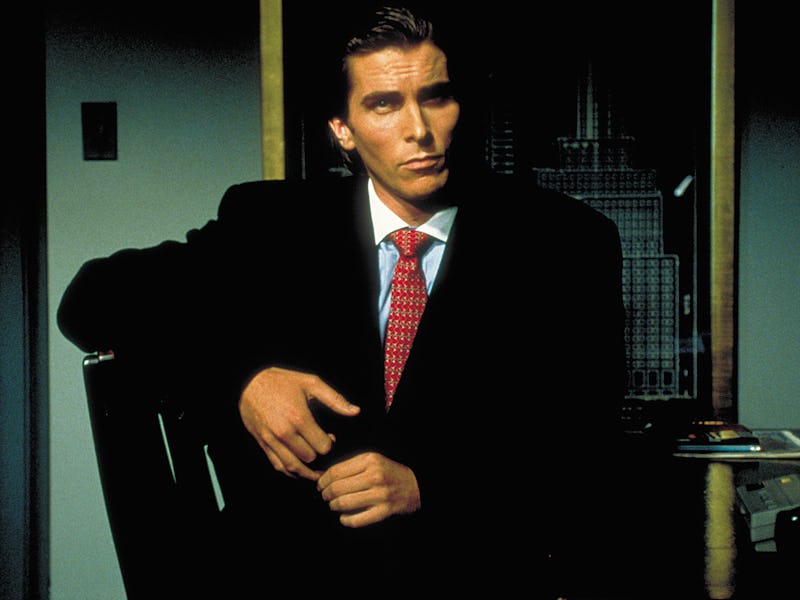We Don’t Need An American Psycho Remake
Let’s just say this remake sounds a little... nuts.

You don’t even need to particularly like American Psycho to recognize that the 2000 film was special. Based on the 1991 book of the same name, the film remains a shockingly nuanced movie about a fairly on-the-nose idea: A soulless money-obsessed yuppie of the 1980s, Patrick Bateman (Christian Bale), is also a literal murderer. Co-written by director Mary Harron and Guinevere Turner, the screenplay for American Psycho took a challenging novel and pulled off the rare feat of being much better than its source material. While author Bret Easton Ellis often claimed that the point of his book was that Bateman was an unreliable narrator, the strength of the movie is that it defied misreading. Bateman was a monster, and the movie was a dark horror/comedy about that titular monster.
But now, we’re going to revisit this all over again. Acclaimed director of excellent films like Call Me by Your Name and Challengers Luca Guadagnino is reportedly in talks to make a new, fresh adaptation straight from Ellis’ text. This proposed remake would be Lionsgate, and would almost certainly look fantastic. In fact, the movie may even be great. But the truth is, we don’t need it and there’s literally nothing that Guadagnino and screenwriter Scott Z. Burns can bring to this concept that will be better, or more transgressive than the original.
For one thing, in casting and directing American Psycho, Mary Harron basically invented Christian Bale. This is hard to believe, but in 1999, Bale was still the guy who played a kid in Newsies, not the complicated leading man we think of today. But Harron saw something in Bale’s strange, twisted audition for Patrick Bateman, and gave audiences the kind of deranged antihero that other “dark” Hollywood movies have been chasing ever since. Joker (2019) only wishes it was as smart as American Psycho, to say nothing of its laughable recent sequel.
The fact that Harron is a woman and her co-screenwriter Guinevere Turner is a woman should be mentioned here. Together, they took a book written by a man, that satirized misogyny and turned that text into an actual anti-misogynistic film. Whether you think the movie succeeds in this message isn’t really the point. Even Ellis admitted that he thought the film clarified some of the book’s satirical tone. And it’s likely that Harron and Turner sticking to their own ideas about the novel resulted in this sublimation. Why would we now go backward? Why does there need to be a new American Psycho directed by a man and written by a man? We had a perfect American Psycho directed and written by women, critically acclaimed and beloved by people of all genders and backgrounds. What could the point of doing this now?
One easy answer is, perhaps... politics. Because the book was written in the 1980s, Bret Easton Ellis’ ideas about Donald Trump will scan as vaguely prescient now. For soulless capitalist social climbers, Trump was something of a role model for the kinds of people you’d never want to be friends with in the 1980s or now. That said, Trump’s omnipresence in pop culture represented something different even in the year 2000 than he does now.
Mary Harron, directing American Psycho.
The first episode of Sex and the City in 1998 finds Kim Cattrall’s Samantha favorably name-checking Trump, and of course, a year after American Psycho, Trump cameoed as himself in Zoolander. Arguably, the 2000 film American Psycho had a slightly smarter take on that brand of ruthless businessman, even if Trump isn’t physically in the film.
But now because Trump is mentioned so often in the original novel, it seems impossible that a new film version won’t fixate on that particular detail. Again, whatever Guadagnino hypothetically cooks up, whether it’s very politically charged or not, will probably be competent and even objectively great. But that doesn’t mean it will be less subtle than the original film. Because of the way the classic film crystallizes the point of the book and amps up the faux ’80s-ness of the aesthetics, it succeeds in being timeless. The danger of a remake is the opposite; Guadagnino’s take threatens to be faux-prescient about the dangers of Trump and a certain kind of American machismo, rather than truly prescient like the original film. In other words, the artistry of the 2000 American Psycho was to expose the mainstream to a disturbing underbelly of capitalist sharks. All a remake can do is to remind us of horrible things we already know all too well.